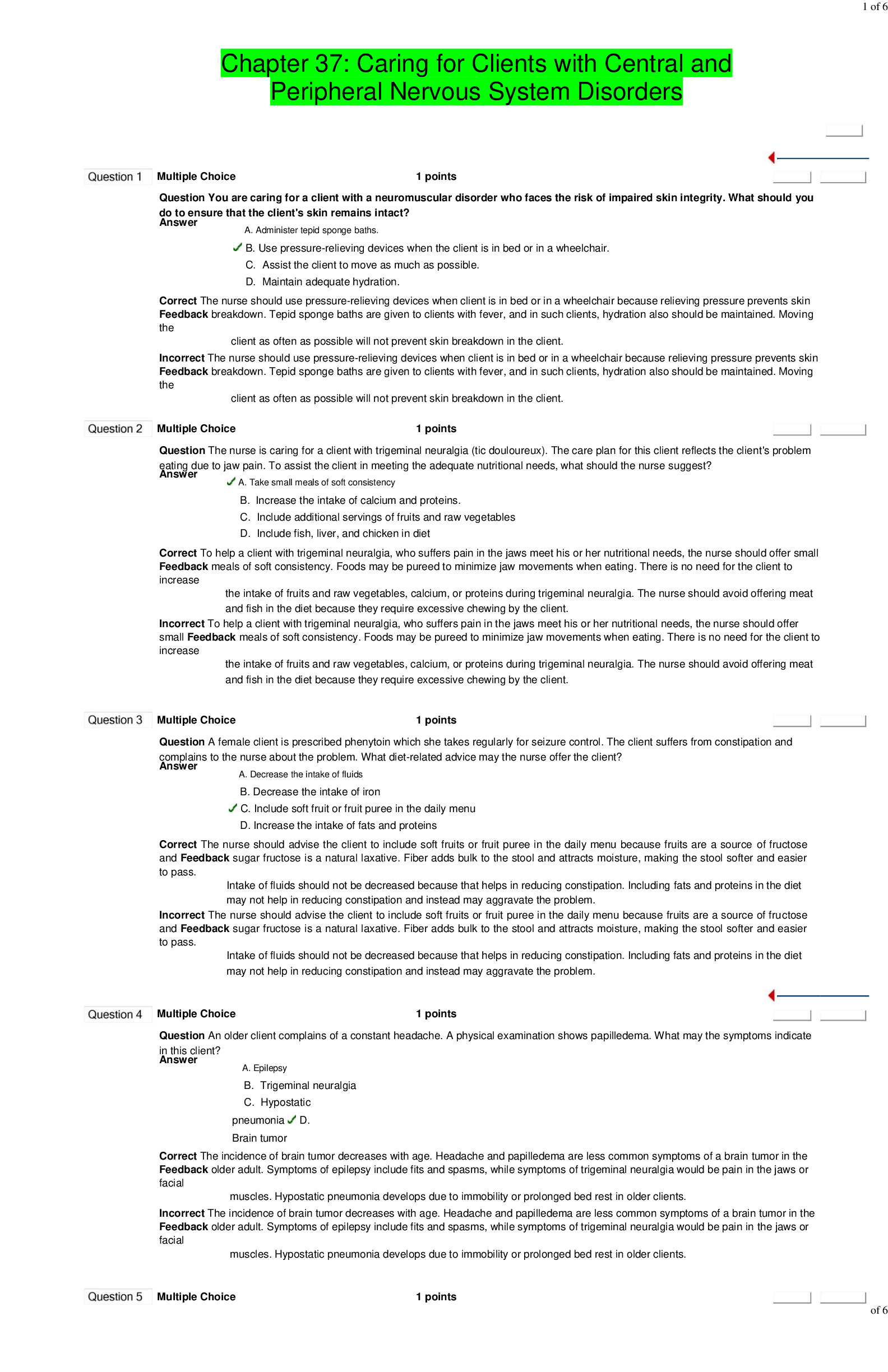
Systems Analysis and Design 13th Edition by Scott Tilley | All Chs 1-13 | SOLUTIONS MANUAL
*NURSING > QUESTIONS & ANSWERS > Chapter 37: Caring for Clients with Central and Peripheral Nervous System Disorders (All)
1 of 6 Chapter 37: Caring for Clients with Central and Peripheral Nervous System Disorders Multiple Choice 1 points Question You are caring for a client with ... a neuromuscular disorder who faces the risk of impaired skin integrity. What should you do to ensure that the client's skin remains intact? Answer Question The nurse is caring for a client with trigeminal neuralgia (tic douloureux). The care plan for this client reflects the client's problem eating due to jaw pain. To assist the client in meeting the adequate nutritional needs, what should the nurse suggest? Question A female client is prescribed phenytoin which she takes regularly for seizure control. The client suffers from constipation and complains to the nurse about the problem. What diet-related advice may the nurse offer the client? Multiple Choice 1 points Question An older client complains of a constant headache. A physical examination shows papilledema. What may the symptoms indicate in this client? Question You are taking care of a client who is taking an anticonvulsant. Why should you advise the client not to stop taking the drug abruptly? Question A client you are caring for experiences a seizure. What would be a priority nursing action? Question The nurse is caring for a client hospitalized after a motor vehicle accident. The client has a comorbidity of Parkinson's disease. Why should the nurse closely monitor the condition and the drug regimen of a client with Parkinson's disease? Question You are the nurse caring for a client with Guillain- Barré syndrome (GBS). The client also has an ascending paralysis. Knowing the complications of the disorder, what should you keep always ready at the bedside? Question A client is experiencing muscle weakness and an ataxic gait. The client has a diagnosis of multiple sclerosis (MS). Based on these symptoms, the nurse formulates “Impaired physical mobility” as one of the nursing diagnoses applicable to the client. What nursing intervention should be most appropriate to address the nursing diagnosis? Question Because of the pain in her facial muscles and jaws a young female client with Bell's palsy is upset because she is unable to communicate properly. What advice can be given to the client to improve her speech? Question The critical care nurse is caring for a client with bacterial meningitis. The client has developed cerebral vasculitis and increased ICP. What neurologic sequelae might this client develop? Question You are teaching a class on your unit about the assessment of neurologic clients who have infectious or inflammatory disease processes. After completing an initial assessment, what would you teach the nurses on your unit is the next step in caring for these clients? Question You are caring for a client with an inoperable brain tumor. What is a major threat to this client? Question The nurse is caring for a client hospitalized with a severe exacerbation of Myesthenia Gravis. When administering medications to this client what is a priority nursing action? Question A 55-year-old female client presents at the walk-in clinic complaining of feeling like a mask is on her face. While doing the initial assessment, the nurse notes the demonstration of a pill -rolling movement in the right hand and a stooped posture. Physical examination shows bradykinesia and a shuffling gait. What would the nurse suspect is the causative factor for these symptoms? Question A client diagnosed with Parkinson's disease has developed slurred speech and drooling. The nurse knows that these symptoms indicate which of the following? Question A client with Parkinson's disease asks the nurse what their treatment is supposed to do since the disease is progressive. What would be the nurse's best response? Question What drug, prescribed for Parkinson's disease, has neuroprotective properties? Question A client diagnosed with Huntington's disease has developed severe depression. What would be most important for the nurse to assess for? Question The nursing instructor gives their students an assignment of making a plan of care for a client with Huntington's disease. What would be important for the students to include in the teaching portion of the care plan? Question The school nurse notes a 6-year-old running across the playground with their friends. The child stops in mid-stride, freezing for a few seconds. Then the child resumes their progress across the playground. The school nurse suspects what in this child? Question A client with a brain tumor has been admitted for Gamma knife treatment. What preparation for the treatment should the nurse give the client? Question The nurse is caring for a client with an inoperable brain tumor. What teaching is important for the nurse to do with these clients? Question The nursing instructor is teaching the senior nursing class about neuromuscular disorders. When talking about Multiple Sclerosis (MS) what diagnostic finding would the instructor list as being confirmatory of a diagnosis of MS? Question A client you are caring for has had a seizure. How would you document this event? Select all that apply. [Show More]
Last updated: 3 years ago
Preview 1 out of 6 pages

Buy this document to get the full access instantly
Instant Download Access after purchase
Buy NowInstant download
We Accept:

Can't find what you want? Try our AI powered Search
Connected school, study & course
About the document
Uploaded On
Apr 28, 2020
Number of pages
6
Written in
All
This document has been written for:
Uploaded
Apr 28, 2020
Downloads
0
Views
121
Scholarfriends.com Online Platform by Browsegrades Inc. 651N South Broad St, Middletown DE. United States.
We're available through e-mail, Twitter, Facebook, and live chat.
FAQ
Questions? Leave a message!
Copyright © Scholarfriends · High quality services·